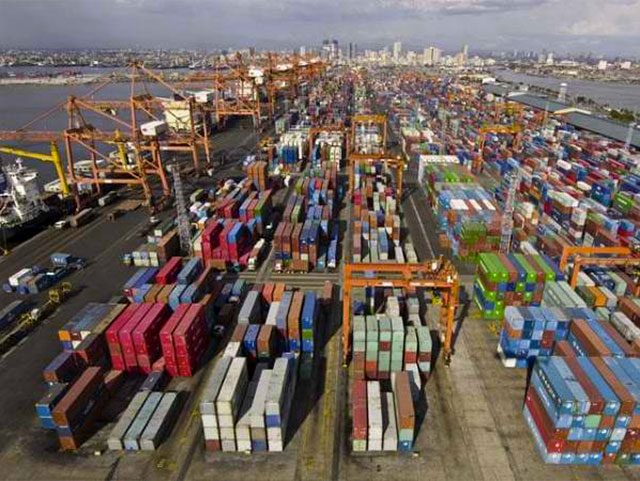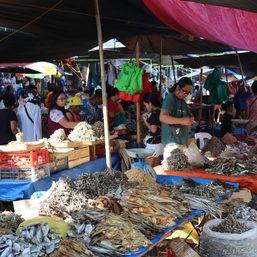SUMMARY
This is AI generated summarization, which may have errors. For context, always refer to the full article.

MANILA, Philippines – Malacañang has appealed to the private sector to pull out as many of their containers as they can from the Port of Manila in view of two major events that would interrupt port operations this month.
Secretary to the Cabinet Rene Almendras – tasked to resolve the congestion in Manila ports – made the call to importers and businessmen in a news briefing on Tuesday, January 6.
Almendras cited two upcoming major events, the Feast of the Black Nazarene on Friday, January 9; and the visit of Pope Francis from January 15-19. Both events, to be held in Manila, are expected to draws millions of people.
“We are appealing to the private sector, we are appealing to the importers, to all the cargo handlers: Can you please pull out as much of your cargos now while we are able to? What do we mean by now? That’s today, tomorrow, and Thursday,” he said.
Almendras said that while “things are moving well” in terms of cargo movement in the port of Manila, the two events would cause a virtual standstill in traffic in Manila on certain dates this month.
“On Friday, we have the Feast of Poong Nazareno where we know no trucks or anyone in the area can move, especially once the procession begins. And then, next week, we have a very important visitor and we expect that as early as Friday, there will again be a disruption in the flow of traffic and goods,” he said.
Operations will be back to normal from Saturday, January 10, to Wednesday, January 14, before the Pope’s visit forces road closures around the metro. Malacañang earlier declared 3 days of the 5-day papal visit as special non-working holidays in Metro Manila – January 15, 16, and 19. January 17 and 18 fall on a Saturday and Sunday.
Almendras said while the government has improved port congestion even over the recent holidays, withdrawals from the ports over the weekend have again decreased.
“In the beginning, we already reached almost 2,000 remember? Last Saturday and Sunday, we barely had a hundred. So we are appealing: This is a good time for you to withdraw, to pull out all the cargo – Saturday and Sunday – because next week we only have Monday, Tuesday, and Wednesday,” he said.
Almendras added: “Thursday, all the activities will be starting already on securing the routes of the Pope and all the facilities and the barriers will be up. There will be restriction to traffic flows by that time. So, naturally, the flow of goods from the port will also be affected.”
The Cabinet official said port congestion is still an ongoing problem, but predicts the situation will normalize by February.
Use papal visit to decongest
Almendras was optimistic about using the papal visit “holidays” to help decongest the ports.
“We are also going to do something different during the time that the Pope is going to be here. Since we do not expect export cargos to be brought to the pier, we are going to try to move out as much empty containers as we can during the holidays that will be caused – because of the Pope’s visit,” he said.
Almendras cited an “arrangement” between the government and the shipping lines “targeted to decongest the empty containers left in the country” during those days.
He also called attention to a new trend authorities have noticed – the “significant increase in the refrigerated vans not being pulled out.”
“As a matter of fact, we have doubled the number of refrigerated vans in our Port of Manila today than is normal. So we also ask through media, to all those importers, all those businesses who have these refrigerated vans inside the port, please pull them out as fast as you can,” he said.
Almendras gave assurances “all the government offices are open” to help the private sector bring out their shipment.
The shipment of goods in and out of the country got caught in a gridlock when Manila imposed a truck ban starting February last year to ease traffic.
In August 2014, the Philippine Statistics Authority reported a decline in imports from $4.889 billion in June 2013, to $4.715 billion in June this year.
Economists pointed out that the ban caused an increase in the prices of some basic commodities as many companies struggled in transporting their imported raw materials to their factories.
In September, Manila finally lifted the daytime truck ban – heeding calls from the national government, business and other sectors. – Rappler.com
Add a comment
How does this make you feel?


![[In This Economy] Can the PH become an upper-middle income country within this lifetime?](https://www.rappler.com/tachyon/2024/04/tl-ph-upper-income-country-04052024.jpg?resize=257%2C257&crop=295px%2C0px%2C720px%2C720px)


There are no comments yet. Add your comment to start the conversation.